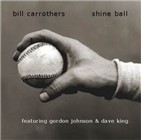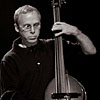Home » Jazz Articles » Album Review » Bill Carrothers: Shine Ball
Bill Carrothers: Shine Ball
Still, Carrothers' openmindedness is nothing new to those familiar with earlier records like the dark trio record Ghost Ships (Sketch, 2003) and the sweepingly ambitious Armistice 1918 (Sketch, 2004)—one of last year's best albums. Shine Ball—an album almost entirely comprised of free improvisations—is a logical next step for Carrothers, a trio record that affirms him as one of America's most sadly underappreciated talents.
Bassist Gordon Johnson's is equally undervalued, but in a career stretching back thirty years he's played with a breadth of artists from Maynard Ferguson and Chuck Mangione to Greg Brown. Dave King is best known as the drummer for The Bad Plus, but on albums by Craig Taborn and the free-bop group Happy Apple he's shown capabilities that extend well beyond TBP's rather singular focus.
Free improvisation can often seem amorphous, but Carrothers, Johnson, and King prove it doesn't have to be. While their approach is different, the trio shares a similar ambition to pulling shape out of the ether that pianist Paul Bley did on his outstanding Not Two, Not One (ECM, 1999). Carrothers is less idiosyncratic, although in his use of prepared techniques he shares a similar belief that the instrument can be expanded well beyond its traditional confines. Similarly, King finds ways to take his drum kit beyond the norm, leaving Johnson as the only player whose instrument remains unaltered.
That's not to say that Shine Ball doesn't feel like a piano trio, but Carrothers' and King's explorations of expanded texture lend it a unique complexion. Still, the broadest palette in the world would mean nothing if it weren't for the trio's unerring chemistry. Whether mining the bleakest of territories on "Bourbon, where Carrothers proves there's beauty in darkness, or the aptly-titled "One Note Slamba, with Johnson and King pushing a fast swing over Carrothers' repeated triplet, there's an underlying sense of focus that makes this free music with a distinct purpose. "Data Has Feelings is more jaggedly chaotic, but it's clear everyone is heading in one direction, equally so on "Millipede, sounding like a skewed version of Peanuts music, and "Maelstrom, which begins spaciously but ultimately moves to a place more appropriate to its name.
Free music involves risk by definition, but Carrothers demonstrates that a firm meeting of the minds can truly build something out of nothing. Shine Ball is spontaneous composition of the highest order—an album that, had it been released earlier, would no doubt have appeared on many of the year's top ten lists.
Track Listing
Shine Ball; Bourbon; One Note Slamba; E.T. Phone Home; Millipede; Data Has No Feelings; Shoe-In; Playboy Pinball Machine; Maelstrom; FInkzg; Creep Show; Made in China; Watchman, Tell Us of the Night; El Cocodrilo.
Personnel
Bill Carrothers
pianoBill Carrothers: prepared piano; Gordon Johnson: acoustic bass; Dave King: drums, waterphone.
Album information
Title: Shine Ball | Year Released: 2005 | Record Label: Fresh Sound New Talent
Tags
PREVIOUS / NEXT
Support All About Jazz
 All About Jazz has been a pillar of jazz since 1995, championing it as an art form and, more importantly, supporting the musicians who make it. Our enduring commitment has made "AAJ" one of the most culturally important websites of its kind, read by hundreds of thousands of fans, musicians and industry figures every month.
All About Jazz has been a pillar of jazz since 1995, championing it as an art form and, more importantly, supporting the musicians who make it. Our enduring commitment has made "AAJ" one of the most culturally important websites of its kind, read by hundreds of thousands of fans, musicians and industry figures every month.






















